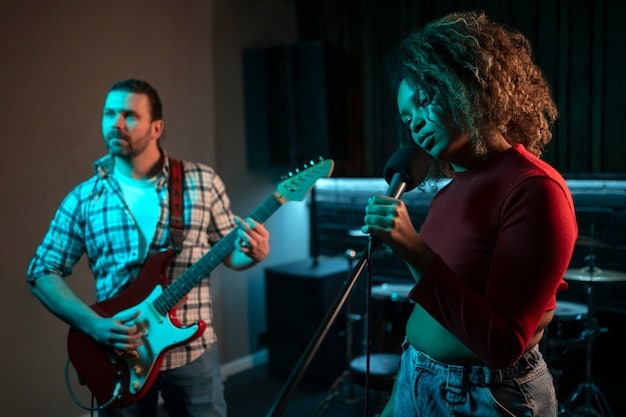Protecting Your Rock Music: A Legal Guide for Emerging US Artists

Emerging rock artists in the US can legally protect their music and brand by understanding copyright laws, registering trademarks, and carefully crafting contracts to safeguard their creative work.
Navigating the legal landscape can seem daunting when you’re focused on creating music. However, for emerging rock artists: how to legally protect your music and brand in the US is crucial for long-term success. Let’s explore essential steps to safeguard your artistic endeavors.
Copyright Basics for Rock Musicians
Understanding copyright is the first step in protecting your music. Copyright law grants creators exclusive rights over their original works, including songs, lyrics, and recordings. Here’s what you need to know.
What Does Copyright Protect?
Copyright protects the tangible expression of your creative ideas. This includes your song lyrics, melodies, and the specific recording of your song.
It’s essential to understand that copyright does not protect the idea itself, but the way it is expressed.
How to Obtain Copyright Protection
Copyright protection is automatic upon creation of an original work. However, registering your work with the U.S. Copyright Office provides additional legal benefits.
- Automatic Protection: As soon as you write and record a song, it’s automatically protected by copyright.
- Registration Benefits: Registering your work allows you to sue for infringement and claim statutory damages and attorney’s fees.
- Registration Process: The US Copyright Office offers online registration that’s relatively straightforward.

Registering your work gives you a strong legal standing if someone infringes on your copyright.
Trademarking Your Band Name and Logo
Your band’s name and logo are essential parts of your brand. Trademarking these elements prevents others from using them and helps you build recognition.
Why Trademark Your Band?
Trademarks protect your brand identity. Without a trademark, other bands could use a similar name or logo, confusing fans and diluting your brand.
A trademark can be a word, phrase, symbol, or design that identifies and distinguishes your goods or services.
The Trademark Registration Process
The process involves searching for existing trademarks, filing an application, and undergoing examination by the U.S. Patent and Trademark Office (USPTO).
- Trademark Search: Conduct a comprehensive search to ensure your desired name and logo aren’t already in use.
- Application Filing: File a trademark application with the USPTO, specifying the goods/services you provide (music, merchandise, etc.).
- Examination: The USPTO will review your application for compliance with trademark laws and regulations.
Securing a trademark for your band name and logo is a significant step in protecting your brand identity and preventing others from profiting from your hard work.
Contracts Every Rock Artist Should Understand
A solid understanding of contracts is essential for rock artists. Contracts govern your relationships with band members, managers, labels, and other collaborators. Here are a few key contract types.
Band Partnership Agreements
A band partnership agreement outlines the rights and responsibilities of each band member. It’s crucial for preventing disputes and ensuring fair treatment.
This agreement should cover issues like revenue sharing, decision-making, and what happens if a member leaves the band.
Management Agreements
A management agreement defines the relationship between a band and its manager. It specifies the manager’s responsibilities, compensation, and the duration of the agreement.
Carefully review the agreement to understand your manager’s obligations and ensure they align with your band’s goals.

Recording Contracts
Recording contracts dictate the terms under which a record label will record, distribute, and promote your music. Understanding these terms is crucial for maintaining control over your work.
- Rights Granted: Understand what rights (ownership, licensing) you’re granting the label.
- Royalties: Pay close attention to the royalty rates, advances, and recoupment terms.
- Creative Control: Negotiate for as much creative control as possible over your music.
Contracts can be complex, so it’s always a good idea for get legal advice from a lawyer before sign any agreements.
Navigating Performance Rights Organizations (PROs)
Performance Rights Organizations (PROs) play a crucial role in collecting royalties for the public performance of your songs. Understanding how PROs work is essential for rock artists.
What Are PROs?
PROs like ASCAP, BMI, and SESAC collect performance royalties on behalf of songwriters and publishers. When your music is played publicly, these organizations ensure you get paid.
They issue licenses to venues, radio stations, and other entities that play music, and then distribute the royalties to their members.
How to Join a PRO
Joining a PRO involves completing an application and agreeing to their terms. Each PRO has its own membership criteria and fee structure.
- ASCAP (American Society of Composers, Authors and Publishers): Offers membership to songwriters and publishers.
- BMI (Broadcast Music, Inc.): Similar to ASCAP, BMI represents songwriters and publishers.
- SESAC (Society of European Stage Authors and Composers): A smaller, more selective PRO with a different royalty distribution model.
Choose the PRO that best aligns with your career goals and offers the most favorable terms for your specific situation.
Protecting Your Music Online
In the digital age, protecting your music online is crucial. With file sharing and streaming platforms, it’s easier than ever for your music to be used without your permission.
Digital Rights Management (DRM)
DRM technologies can help protect your music from unauthorized copying and distribution. However, DRM can also be controversial due to user restrictions.
Consider using DRM if you’re concerned about piracy, but be aware of the potential impact on user experience.
Monitoring Online Usage
Regularly monitor online platforms to identify unauthorized uses of your music. There are tools and services that can help you track where your music is being played.
- YouTube Content ID: A system that allows copyright holders to identify and manage their content on YouTube.
- Digital Millennium Copyright Act (DMCA): Provides a legal framework for addressing copyright infringement online.
- Takedown Notices: If you find your music being used without permission, you can send takedown notices to the hosting platform.
Staying vigilant and proactive is essential for protecting your music in the digital world.
Working with a Music Attorney
Engaging a music attorney can provide invaluable assistance in navigating the complex legal issues facing rock artists. A good attorney can help you negotiate contracts, protect your intellectual property, and resolve disputes.
When to Hire an Attorney
It’s wise to hire an attorney early in your career, especially before signing any contracts or making significant business decisions.
An attorney can review contracts, attend meetings with labels or managers, and provide guidance on legal matters.
What to Look for in a Music Attorney
Look for an attorney with experience in the music industry and a strong understanding of copyright, trademark, and contract law.
- Industry Experience: Ensure the attorney has a proven track record of representing musicians.
- Specialized Knowledge: Choose an attorney with expertise in the specific areas relevant to your needs (e.g., copyright, contracts, trademarks).
- Communication Skills: Look for an attorney who is responsive, communicative, and able to explain complex legal issues in plain language.
A qualified music attorney is one of the most valuable assets for an emerging rock artist. They will help you navigate the legal complexities to avoid any headaches for your future musical endeavors.
| Key Aspect | Brief Description |
|---|---|
| ©️ Copyright Protection | Safeguards original musical works automatically upon creation. |
| ®️ Trademarking | Protects band name and logo, preventing brand dilution and confusion. |
| 🤝 Contract Awareness | Understanding band partnership, management, and recording contracts is crucial. |
| 🎶 PRO Membership | Joining a Performance Rights Organization ensures you receive royalties for public performances. |
Frequently Asked Questions
▼
Copyright protection is automatic upon creation, but registering with the US Copyright Office provides legal advantages. These include the ability to sue for infringement and claim statutory damages.
▼
Trademarking your band’s name prevents others from using it. It also protects your brand identity, helping you to avoid confusion among fans. This strengthens your presence in the market.
▼
A band partnership agreement should include revenue sharing, decision-making processes, and protocols for when a member leaves. This agreement ensures fairness and minimizes potential disputes among band members.
▼
Understanding recording contracts is crucial because these contracts outline the terms under which a label will record, distribute, and promote your music. This ensures you maintain control over your creative work.
▼
PROs collect performance royalties for songwriters and publishers when their music is played publicly. By joining a PRO, musicians can ensure they receive compensation for the public performance of their music.
Conclusion
Protecting your music and brand as an emerging rock artist in the US involves understanding copyright, trademarking your band name, carefully reviewing contracts, joining a PRO, protecting your music online, and consulting with a music attorney. Taking these steps can help safeguard your creative work and ensure a successful career.





